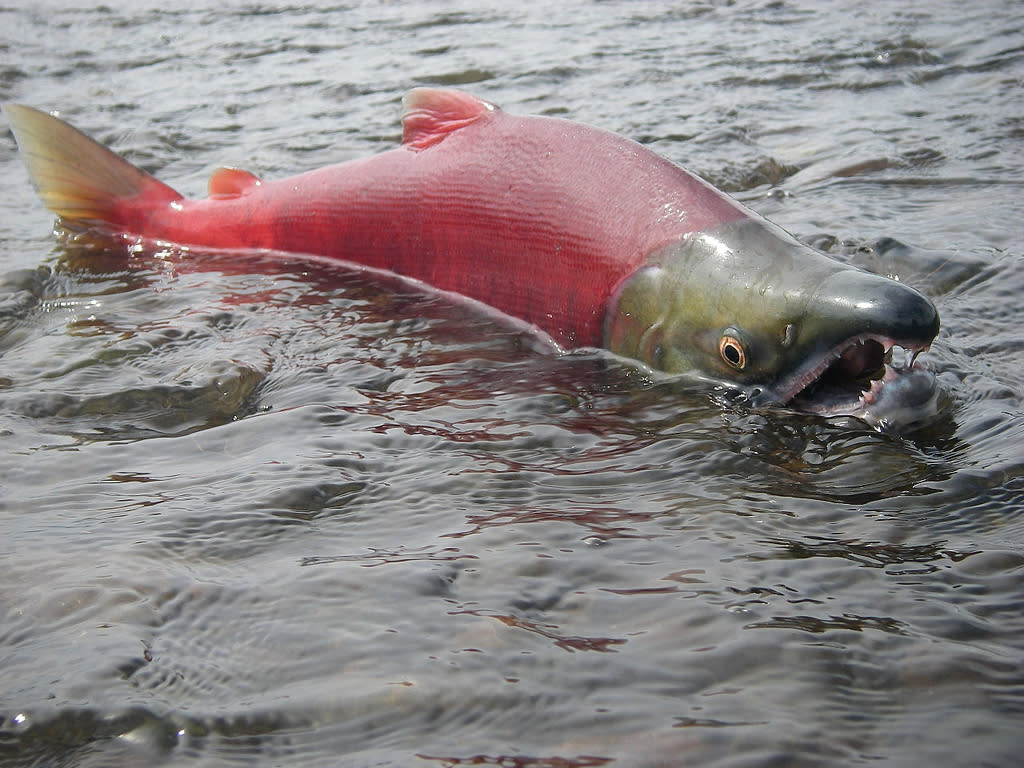Bristol Bay salmon would benefit from added protection in federal law

- Oops!Something went wrong.Please try again later.
A spawning male sockeye salmon is seen in July 2010 in the Wood River, part of the Bristol Bay watershed. Bristol Bay is the site of the world’s largest sockeye salmon runs. (Photo by Thomas Quinn/University of Washington, provided by the Environmental Protection Agency)
As we write, tens of millions of salmon are swimming their way back to Bristol Bay. And for the second year running, those who work the 15,000 jobs the salmon provide each year can celebrate that the proposed Pebble mine no longer threatens to contaminate the headwaters of the greatest wild sockeye salmon fishery in the world.
At least for now.
The U.S. Environmental Protection Agency issued Clean Water Act protections for this amazing fishery in January 2023. That news was welcomed by residents of the region and scores of businesses that are reliant upon the Bristol Bay fishery, along with its $2.2 billion annual economic impact. Since then, Pebble and the state of Alaska have filed four lawsuits in an attempt to keep this ill-conceived, acid-producing mine on life support. Math and science aren’t on their side — not only would the mine irreversibly harm a fishery that could, if not contaminated, continue to produce and provide jobs for centuries to come, but the state of Alaska made a basic math error in one of its lawsuits, leading it to inflate the amount they’re suing American taxpayers for by $630 billion. Clearly, those seeking to exploit Bristol Bay at the risk of its sustainable fishery aren’t taking “no” for an answer.
Fortunately, on May 1, Rep. Mary Peltola introduced the Bristol Bay Protection Act in the U.S. House of Representatives. This bill would codify EPA’s Clean Water Act protections, which protect the headwaters of Bristol Bay, where the Pebble deposit is located, from mining activity. Rep. Peltola’s bill makes the protections Tribes, fishermen and Alaskans fought for in a decades-long battle over the fate of the world’s greatest sockeye salmon fishery more difficult to overturn by administrative action alone. Thank you, Rep. Peltola, for this much-needed legislation.
We’ve each been involved in Bristol Bay’s fishery for decades, one in the lodge business and one running a commercial fishing and direct marketing business. One of us brings people to the fish and the other brings the fish to people. Between the two of us, we’ve got nearly 70 years of hard-won experience in Bristol Bay. We’re not antidevelopment. We’ve both worked in Alaska’s oil fields. And we’ve both traveled to our nation’s capital to testify in front of Congress about the wonders of Bristol Bay and how it’s too valuable to risk losing.
The proposed Pebble mine is an issue that not only cuts across party lines: it obliterates them. The late Sen. Ted Stevens called Pebble the “wrong mine in the wrong place,” and Sens. Lisa Murkowski and Dan Sullivan have both expressed their opposition to Pebble. The Army Corps of Engineers denied a key Pebble permit in 2020, during the Trump administration. These are historic positions for Alaska politicians to take, but facts, science, and public opinion are in Bristol Bay’s corner. In addition to Alaska’s leaders (absent our current governor, Mike Dunleavy), the last three presidents of the United States have all taken actions to protect Bristol Bay and prevent the advancement of the Pebble mine. The EPA began its Clean Water Act review under Obama; the U.S. Army Corps of Engineers denied Pebble’s permit under Trump; and the EPA finalized Clean Water Act protections under Biden. Rep. Peltola’s bill is the next, desperately needed step. It also reflects that the majority of Alaskans have consistently opposed this uniquely dangerous project.
For roughly 20 years, the dark cloud of uncertainty that Pebble cast over the region has united local residents, subsistence, recreational and commercial fishers. That coalition, born in Bristol Bay, is backstopped by organizations, businesses and individuals from coast to coast. Over the course of this campaign, more than 4 million public comments have supported protections for Bristol Bay. Whether you’re a catch and release angler, a big game hunter, someone who loves watching the brown bears snatch salmon mid-air, or whether you just enjoy eating delicious, nutritious wild Bristol Bay sockeye, all those who have spoken in favor of protecting this amazing region can support the Bristol Bay Protection Act.
Alaska Beacon is part of States Newsroom, a nonprofit news network supported by grants and a coalition of donors as a 501c(3) public charity. Alaska Beacon maintains editorial independence. Contact Editor Andrew Kitchenman for questions: info@alaskabeacon.com. Follow Alaska Beacon on Facebook and Twitter.
The post Bristol Bay salmon would benefit from added protection in federal law appeared first on Washington State Standard.

